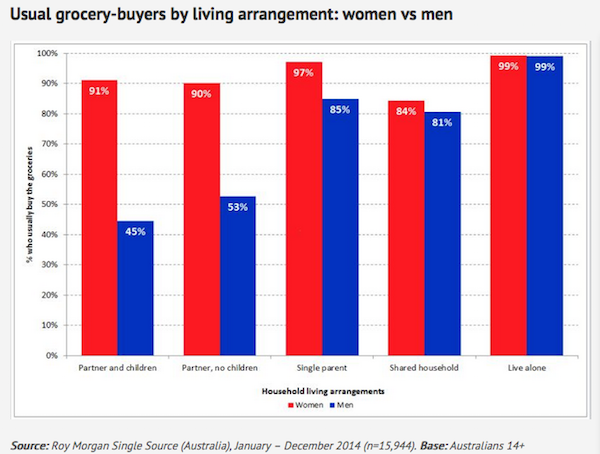 The latest findings from Roy Morgan Research show that a far greater proportion of Australian women than men usually buy the household groceries — and mothers are the most likely of all to do so.
The latest findings from Roy Morgan Research show that a far greater proportion of Australian women than men usually buy the household groceries — and mothers are the most likely of all to do so.
Before looking at specific living arrangements, however, here’s a top line figure for the sake of perspective: 62 per cent of Australians 14 and above who usually do the grocery shopping are women and 38 per cent are men.
The gender divide becomes more apparent among households with kids. No less than 91 per cent of Australian women who live with their partner and at least one child usually buy the groceries; a figure that drops to just 44 per cent of men living in the same household arrangement.
Even in single parent households, 97 per cent of single mums are more likely than single dads, at 85 per cent to buy the groceries.
Among couples with no children in their household, the proportion of women who usually buy the groceries, 90 per cent, is also much higher than men at 53 per cent, although the difference is not as great as in nuclear families.
The only household situation in which men and women are equally as likely to usually do the grocery shopping is when they live alone – 99 per cent each.
Angela Smith, group account director at Roy Morgan Research, says that despite men accounting for half the population, they still don’t account for half of usual grocery buyers, however, the proportion of men who say they usually buy the groceries has grown slightly since 2010, when the overall male:female ratio was 35:65.
“Among different kinds of household living arrangements, women are almost always more likely than men to be the ‘usual’ grocery-buyer, a gender skew that is strongest in traditional nuclear family units,” said Smith.
“Of course, just because someone usually does the grocery shopping, doesn’t necessarily mean they do it alone. Among Aussies who live with their partner and kids, 19 per cent of women and 32 per cent of men share grocery duties; while 27 per cent of women and 43 per cent of men who live with their partner in childless households do the same.
“The fact remains, though, that women – and mothers especially – shoulder most of the grocery buying responsibility.”
















